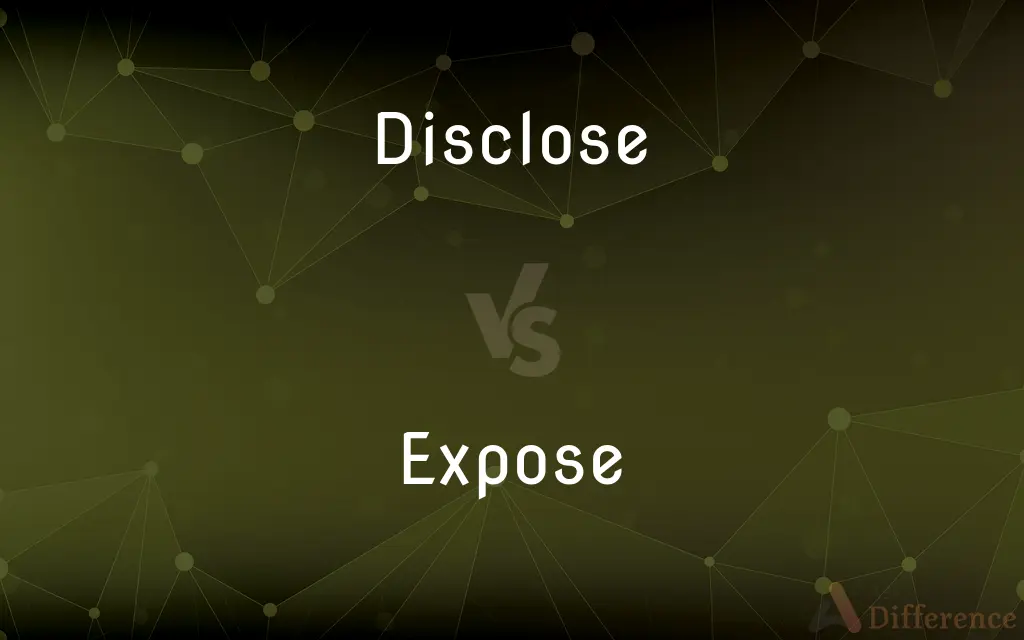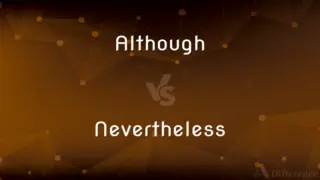Disclose vs. Expose — What's the Difference?
By Fiza Rafique & Maham Liaqat — Updated on April 16, 2024
Disclose typically involves revealing information intentionally, often in a controlled manner, while expose often connotes uncovering hidden truths, usually leading to public awareness.

Difference Between Disclose and Expose
Table of Contents
ADVERTISEMENT
Key Differences
Disclose involves the act of making information known, typically information that was previously private or secret. It implies a deliberate action and is often used in legal, business, or personal contexts to suggest revealing something confidential. On the other hand, expose refers to the act of uncovering or revealing something that is often hidden or unknown. This term conveys a sense of uncovering truths that someone tried to keep hidden and can imply scandal or public scrutiny.
In the context of journalism, to disclose information is to release it responsibly after due consideration, ensuring that sensitive information is communicated with care. Whereas, to expose typically suggests investigative work aiming to uncover wrongdoing or misconduct, often against resistance from those being exposed.
In everyday usage, disclose is often associated with a sense of duty or responsibility. For example, one might disclose financial information to comply with regulations. In contrast, expose is used more dynamically, suggesting a forceful revelation that impacts public perception or causes significant reactions.
Legal contexts highlight another difference: legal professionals might disclose evidence during a trial as part of procedural requirements, while whistleblowers might expose corruption or illegal activities, which can spark investigations or reforms.
In terms of etymology, "disclose" comes from the Old French word "desclos," meaning "to open, expose, reveal," while "expose" derives from the Latin "exponere," meaning "to set out, place outside," which hints at their differing connotations of intention and effect in usage.
ADVERTISEMENT
Comparison Chart
Definition
To reveal or make known intentionally.
To uncover or reveal, often leading to public scrutiny.
Connotation
Controlled, often positive or neutral.
Often negative, associated with scandal or surprise.
Typical Contexts
Legal, business, personal.
Journalism, scandals, investigations.
Intentionality
High; deliberate action.
May be unintentional or accidental.
Public Reaction
Generally measured and expected.
Often dramatic or shock-inducing.
Compare with Definitions
Disclose
To unveil details that were previously unknown.
The scientist disclosed the results of her groundbreaking research.
Expose
To uncover and make known something scandalous.
The journalist exposed the celebrity's illegal activities.
Disclose
To reveal secrets or confidential information.
He disclosed his plans to only a few close friends.
Expose
To reveal something hidden.
The investigation exposed the politician's corruption.
Disclose
To open up to public knowledge.
The documents were disclosed under the freedom of information act.
Expose
To put something out openly that was previously concealed.
The leak exposed confidential emails to the public.
Disclose
To inform about a fact or situation.
The agent disclosed the property's history to the new buyers.
Expose
To subject someone to public scrutiny.
His actions were exposed by the media.
Disclose
To make information known publicly.
The company disclosed its financial results in the annual report.
Expose
To show the true nature of someone or something.
The documentary exposed the harsh realities of the industry.
Disclose
Disclose were a Japanese punk rock band from Kōchi City, heavily influenced by Discharge. Their sound heavily replicates Discharge's style, with an increased use of fuzz and distortion guitar effects.
Expose
Make (something) visible by uncovering it
At low tide the sands are exposed
Disclose
To expose to view, as by removing a cover; uncover.
Expose
Reveal the true, objectionable nature of (someone or something)
He has been exposed as a liar and a traitor
Disclose
To make known (something heretofore kept secret).
Expose
Subject (photographic film) to light when operating a camera
All over Europe, thousands of miles of film are exposed for holiday snaps
Disclose
To open up, unfasten.
Expose
A report in the media that reveals something discreditable
A shocking exposé of a medical cover-up
Disclose
(transitive) To uncover, physically expose to view.
Expose
An exposure or a revelation of something discreditable.
Disclose
(transitive) To expose to the knowledge of others; to make known, state openly, reveal.
Expose
A formal exposition of facts.
Disclose
(obsolete) A disclosure.
Expose
To subject or allow to be subjected to an action, influence, or condition
Exposed themselves to disease.
Exposed their children to classical music.
Disclose
To unclose; to open; - applied esp. to eggs in the sense of to hatch.
The ostrich layeth her eggs under sand, where the heat of the discloseth them.
Expose
To subject (a photographic film, for example) to the action of light.
Disclose
To remove a cover or envelope from;; to set free from inclosure; to uncover.
The shells being broken, . . . the stone included in them is thereby disclosed and set at liberty.
Expose
To deprive of shelter or protection; lay open to danger or harm
Troops that were exposed to gunfire.
Disclose
To lay open or expose to view; to cause to appear; to bring to light; to reveal.
How softly on the Spanish shore she plays,Disclosing rock, and slope, and forest brown!
Her lively looks a sprightly mind disclose.
Expose
To make visible
Cleaning exposed the grain of the wood.
Disclose
To make known, as that which has been kept secret or hidden; to reveal; to expose; as, events have disclosed his designs.
If I disclose my passion,Our friendship 's an end.
Expose
To make known (something discreditable).
Disclose
Disclosure.
Expose
To reveal the guilt or wrongdoing of
Expose a criminal.
Disclose
Make known to the public information that was previously known only to a few people or that was meant to be kept a secret;
The auction house would not disclose the price at which the van Gogh had sold
The actress won't reveal how old she is
Bring out the truth
He broke the news to her
Expose
To engage in indecent exposure of (oneself).
Disclose
Disclose to view as by removing a cover;
The curtain rose to disclose a stunning set
Expose
(transitive) To reveal, uncover, make visible, bring to light, introduce (to).
Expose
(transitive) To subject photographic film to light thereby recording an image.
Expose
(transitive) To abandon, especially an unwanted baby in the wilderness.
Expose
To submit to an active (mostly dangerous) substance like an allergen, ozone, nicotine, solvent, or to any other stress, in order to test the reaction, resistance, etc.
Expose
To make available to other parts of a program, or to other programs.
Expose
To set forth; to set out to public view; to exhibit; to show; to display; as, to expose goods for sale; to expose pictures to public inspection.
Those who seek truth only, freely expose their principles to the test, and are pleased to have them examined.
Expose
To lay bare; to lay open to attack, danger, or anything objectionable; to render accessible to anything which may affect, especially detrimentally; to make liable; as, to expose one's self to the heat of the sun, or to cold, insult, danger, or ridicule; to expose an army to destruction or defeat.
Expose thyself to feel what wretches feel.
Expose
To deprive of concealment; to discover; to lay open to public inspection, or bring to public notice, as a thing that shuns publicity, something criminal, shameful, or the like; as, to expose the faults of a neighbor.
You only expose the follies of men, without arraigning their vices.
Expose
To disclose the faults or reprehensible practices of; to lay open to general condemnation or contempt by making public the character or arts of; as, to expose a cheat, liar, or hypocrite.
Expose
A formal recital or exposition of facts; exposure, or revelation, of something which some one wished to keep concealed.
Expose
The exposure of an impostor or a fraud;
He published an expose of the graft and corruption in city government
Expose
Expose or make accessible to some action or influence;
Expose your students to art
Expose the blanket to sunshine
Expose
Make known to the public information that was previously known only to a few people or that was meant to be kept a secret;
The auction house would not disclose the price at which the van Gogh had sold
The actress won't reveal how old she is
Bring out the truth
He broke the news to her
Expose
To show, make visible or apparent;
The Metropolitan Museum is exhibiting Goya's works this month
Why don't you show your nice legs and wear shorter skirts?
National leaders will have to display the highest skills of statesmanship
Expose
Remove all or part of one's clothes to show one's body;
Uncover your belly
The man exposed himself in the subway
Expose
Disclose to view as by removing a cover;
The curtain rose to disclose a stunning set
Expose
Put in a dangerous, disadvantageous, or difficult position
Expose
Expose to light, of photographic film
Expose
Expose while ridiculing; especially of pretentious or false claims and ideas;
The physicist debunked the psychic's claims
Expose
Abandon by leaving out in the open air;
The infant was exposed by the teenage mother
After Christmas, many pets get abandoned
Common Curiosities
What is the typical context where "expose" is used?
"Expose" is commonly used in contexts involving journalism, investigations, or scandals where hidden information is revealed.
Can disclose and expose be used interchangeably?
While both can involve revealing information, they are not typically interchangeable due to their different connotations; disclose is more controlled, and expose often implies unexpected or shocking revelations.
What does it mean to disclose information?
To disclose information means to make it known or public, usually in a controlled and intentional manner.
How does media typically use the term expose?
Media often uses "expose" to describe investigative reports that reveal hidden wrongdoings or secrets to the public.
What are ethical considerations in disclosing information?
Ethically, it is important to consider the potential impact on privacy, security, and personal rights when disclosing information.
What is the legal importance of disclosing information?
In legal contexts, disclosing information can be crucial for transparency, compliance with regulations, and ensuring fair proceedings.
What impact does exposing information have on public perception?
Exposing information can significantly alter public perception, often leading to outrage, scandal, or calls for change.
Can a person expose themselves in a non-physical way?
Yes, a person can expose themselves in a non-physical way by revealing personal or sensitive information about themselves.
What are the risks of disclosing confidential information?
Risks include legal consequences, loss of trust, and potential harm to individuals' privacy and security.
Is it always negative to expose something?
Not necessarily; exposing can lead to positive changes, such as reforms and increased accountability, despite often being associated with negative revelations.
What is a synonym for disclose?
Reveal, unveil, and divulge are synonyms for disclose.
In what situations is it necessary to disclose information?
It is necessary to disclose information in compliance with laws, for transparency in business and governance, or when it serves the public interest.
What is a synonym for expose?
Uncover, reveal, and unmask are synonyms for expose.
How does one typically respond to being exposed?
Responses to being exposed vary but often include denial, apology, or making corrective actions.
What legal protections exist for those who expose wrongdoing?
Many jurisdictions have whistleblower protections that safeguard individuals who expose illegal activities or unethical behavior.
Share Your Discovery

Previous Comparison
Petroleum vs. Petrol
Next Comparison
Although vs. NeverthelessAuthor Spotlight
Written by
Fiza RafiqueFiza Rafique is a skilled content writer at AskDifference.com, where she meticulously refines and enhances written pieces. Drawing from her vast editorial expertise, Fiza ensures clarity, accuracy, and precision in every article. Passionate about language, she continually seeks to elevate the quality of content for readers worldwide.
Co-written by
Maham Liaqat













































